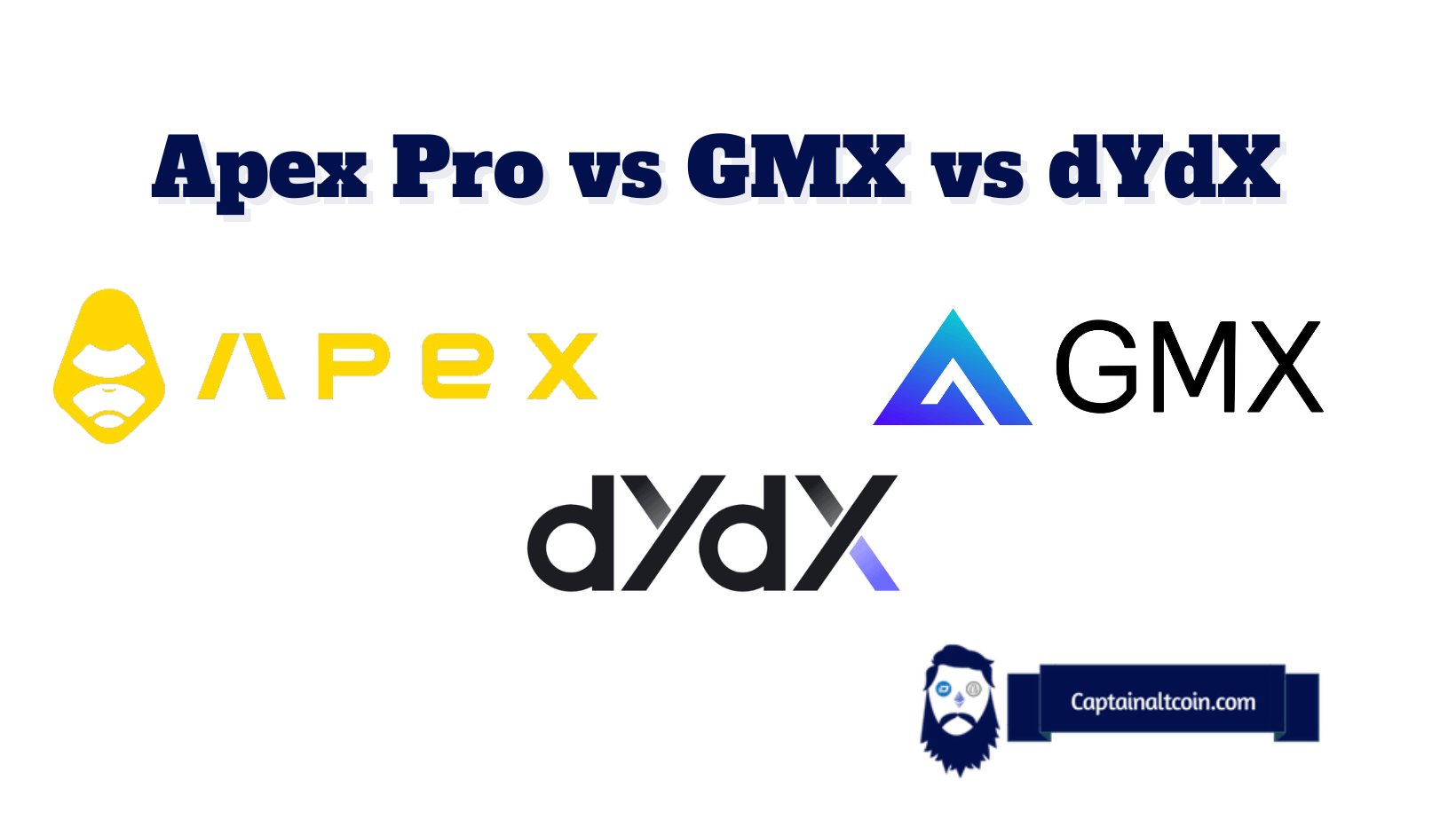
dYdX is a leading decentralized exchange that supports spot, margin and perpetual trading. GMX is a decentralized spot and perpetual exchange that supports low swap fees and zero price impact trades and works on a multi-asset AMM model.
Let’s get a quick overview of these derivative DEX exchanges in our tabular comparison:
| 🛡️ Security & Privacy | |
|---|---|
| dYdX | Self-custody of funds, StarkEx integration, forced fund retrieval, STARK proofs, KYC in selected campaigns, community governance |
| GMX | Self-custody of funds, Arbitrum and Avalanche safety provisions, fully non-KYC, community governance |
| ApeX Pro | Self-custody of funds, StarkEx integration, forced fund retrieval, STARK proofs, fully non-KYC, community-dedicated space under development |
| ⚡ Transaction Cost & Efficiency | |
|---|---|
| dYdX | Orderbook interface, Mid-Market Price, no gas fees, tiered fees, greatest number of perpetual contracts, spot and margin trading, Layer 1 Ethereum |
| GMX | Multi-asset AMM model, network execution fees, less perpetual contracts, new trading pairs introduced frequently |
| ApeX Pro | Orderbook interface, Last Traded Price, no gas fees, low maker and taker fees, VIP program, fewer perpetual contracts, multi-chain deposits and withdrawals |
| 💰 Tokens & Rewards | |
|---|---|
| dYdX | Trading Rewards program, 2,876,716 $DYDX distributed in 28-day epochs, staking $DYDX for additional rewards |
| GMX | Escrowed tokens in staking program, community rewards, revenue-sharing programs |
| ApeX Pro | Escrowed and liquidity tokens, 1,000,000,000 $APEX total supply, 25,000,000 $APEX minted to create $BANA, Trade-to-Earn event, $BANA-USDC Pool, Buy & Burn Pool, $190,000 worth of $BANA distributed weekly for a year |
Decentralized exchanges (DEXs) have gained immense popularity in the crypto industry for their decentralized and permissionless nature, which provides financial freedom without intermediaries supervising trades. DEXs offer greater security and privacy, and traders own their funds and assets without any geographical restrictions or KYC requirements.
This article provides a comprehensive comparison of three derivatives DEXs, namely ApeX Pro, dYdX, and GMX, based on three broad measures: security and privacy, transaction and cost efficiency, and token ecosystems and reward-generating offerings.
What you'll learn 👉
(1) Security & Privacy
All three DEXs prioritize privacy-preserving measures, where traders have self-custody of their funds. dYdX and ApeX Pro integrate StarkWare’s Layer 2 scalability engine StarkEx to facilitate forced requests for retrieving funds even when the DEX is not in service. dYdX implemented KYC in a previous campaign, while GMX relies on the safety provisions of Arbitrum and Avalanche. ApeX Pro is still working on creating a community-dedicated space for governance and discussions.
Self-custody of funds, StarkEx integration, forced fund retrieval, STARK proofs, KYC in selected campaigns, community governance, supports only Ethereum
Self-custody of funds, Arbitrum and Avalanche safety provisions, fully non-KYC, community governance
Self-custody of funds, StarkEx integration, forced fund retrieval, STARK proofs, fully non-KYC, community-dedicated space under development, multichain support
(2) Transaction Cost & Efficiency
ApeX Pro and dYdX utilize an orderbook interface that removes the barrier to entry for traditional and aspiring traders to step into DeFi. ApeX Pro uses Last Traded Price, while dYdX uses Mid-Market Price. With StarkWare’s integration, ApeX Pro processes approximately ten trades and 1,000 order placements per second at no gas fees, together with low maker and taker fees. dYdX offers comprehensive tiered fees catered to different traders’ trading sizes without gas fees. GMX charges network execution fees, and gas fees paid by the trader may vary based on market factors.
(3) Tokens & Rewards
All DEXs offer revenue-sharing programs for community members and token holders. dYdX distributes rewards based on trading volume and also offers staking rewards. GMX uses escrowed tokens in its staking program to stabilize and sustain reward token value. ApeX Pro enriches its token ecosystem with escrowed and liquidity tokens, which allows for more dynamism in maximizing token value and sustaining long-term token use cases for the community than using a single token for all DEX initiatives.
With a total supply of 1,000,000,000 $APEX, ApeX Pro mints 25,000,000 $APEX to create $BANA, which traders can swap for tangible incentives in USDC and redeem $APEX tokens. Traders can also add liquidity to a $BANA-USDC Pool in exchange for LP Tokens and exchange them for more $BANA. ApeX Pro maintains the stability of $BANA’s value with a Buy & Burn Pool, distributing $190,000 worth of $BANA weekly for a year.
In conclusion, as DEXs find their footing in a world dominated by CEXs, traders can choose DEXs based on their preferred benefits. ApeX Pro, with its growth within its first week of mainnet launch and an ecosystem that combines the best features of existing DEXs, is one to watch out for in 2023.






